How to deal (handle) with difficult (bad) relatives (family members) | How do you control (handle) anger in relatives (family members)? | Keeping your cool with difficult family members | How to deal with negative family members | How to deal with family members that disrespect you
Hello friends, how are you doing today? Welcome to #Relationships-Parenting website / blog.
Let you and your well-wishers live a happy and prosperous life through out your life term.
In this website / blog, you will always learn about #Relationships #Parenting.
Also subscribe / follow to our various social media networks from here to learn more about #Relationships #Parenting:
Just before going to “How to deal (handle) with difficult (bad) relatives (family members) | How do you control (handle) anger in relatives (family members)? | Keeping your cool with difficult family members | How to deal with negative family members | How to deal with family members that disrespect you“, let us know a brief, basic and very important information.
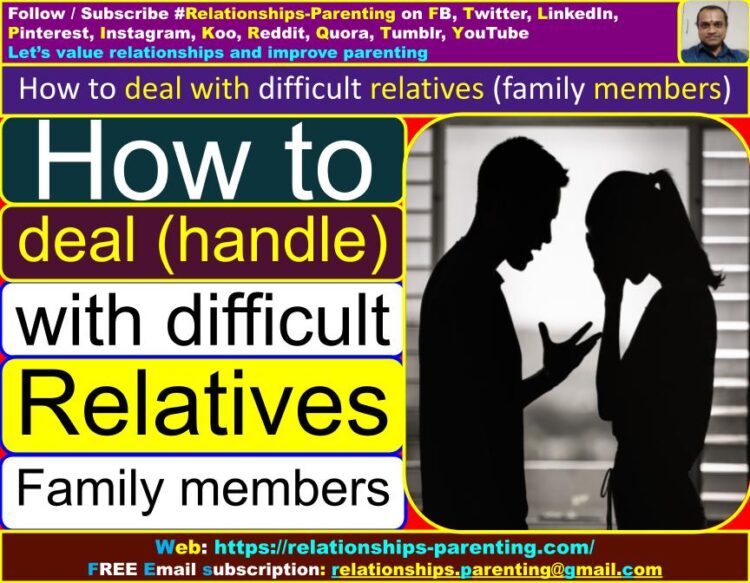
Who is a relative (meaning) : A relative is a person who is associated with us either through direct blood relationship (kinship) or via affinity.
Examples of relatives are : Parents, siblings, uncles, aunts, grandparents, cousins, nieces and nephews – they are all relatives. Relatives may be connected to your family by blood or marriage.
Are relatives important? : These relationships (bonds) are off course important, because relatives and family members help us get through bad times and good times in various situations in our lives.
Family or relatives are really important because they can provide support and security to us with unconditional love. They always look to see and bring out the best in you, even if you don’t see it for yourself.

Some of the common questions asked with respect to this subject is as given below:
How would you deal with a difficult family member? | What to do when relatives hurt you? | How do you deal with a family member who lies about you? | What is a toxic family member? |
Is it OK to cut off toxic family members? | How to deal with family members that disrespect you | How to deal with stressful family members | How to set boundaries with toxic family members |
When family members disrespect you | How to deal with toxic family members | Keeping your cool with difficult family members | Dealing with angry family members of patients |
How do you deal with a disrespectful relative? | How do you deal with an inconsiderate family member? | How do you treat someone who disrespects you? | And many more…
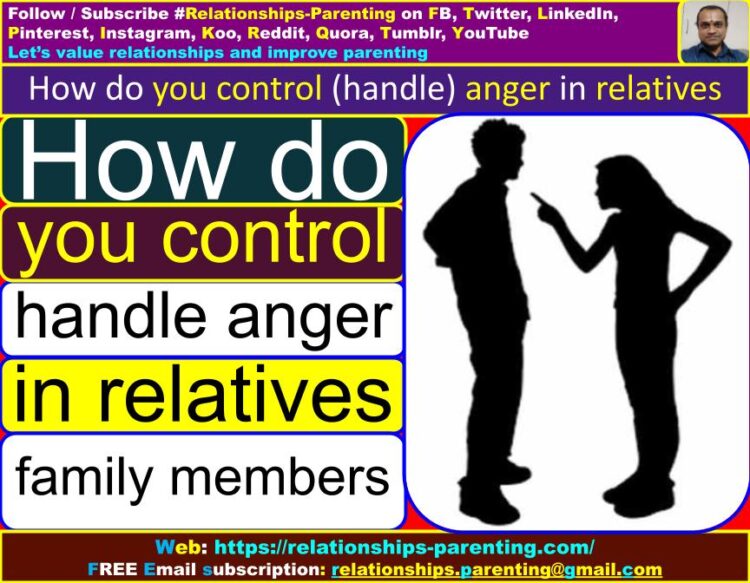
It is normal to experience occasional misunderstandings, differences of opinion, disputes or selfishness among family members. In fact, challenges and difficulties in family and relatives are very common.
However, if you find that your relationships with multiple family members or with one family member in particular are especially difficult, you may want to take some time to rethink that relationship more closely.
You can’t choose your family at birth, which means you can be loaded with difficult family members that you have no choice but to deal with. Calm your mind and ask yourself if the relationship is insecure or a little awkward to handle.
If your family relationship is abusive, you may want to reconsider limiting your interactions with that person(s). In fact, past experience shows that chronic conflict and negative relationships with people can affect your mental and physical health.
On the other hand, if you’re only dealing with negativity, obnoxious behavior, minor annoyances, or overly dramatic family members, there are things you can do to make these interactions less painful for you.

List of tips about “How to deal with difficult relatives (family members)” is as given below:
Avoid fixing a difficult person : Fixing a difficult family member or relative is very difficult. There mentality is different and your way of thinking is different.
Sometimes it’s tempting to try to help someone you care about, even though you could probably make some effort to help them. This may work sometimes, but often your efforts are not rewarded.
You have to accept them for who they are and the difficulties that come with dealing with them. You can do this by practicing compassion for the person.
Even if you don’t exactly agree with their ideas and solutions, let go of their judgments and respect them for who they are as a person. In fact, trying to fix difficult people you know or make their lives better can become a huge burden on you, because the more you do for them, the more difficulties you face.
Once you learn to accept them as they are, you may find that dealing with them doesn’t seem like such a huge or challenge.
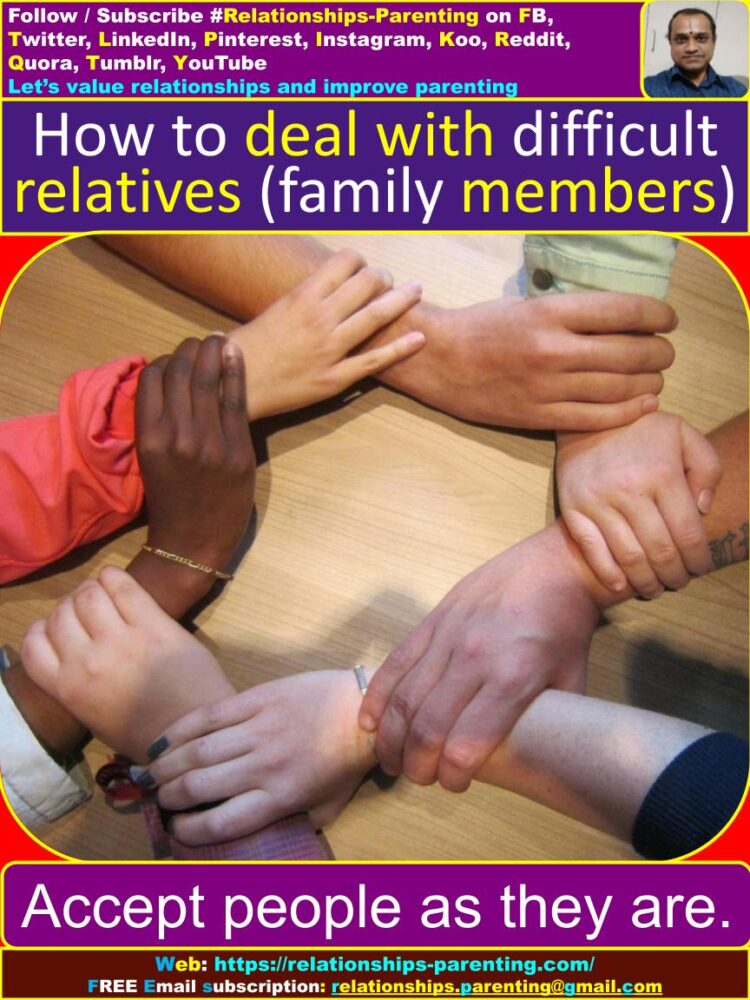
Be ready mentally :If you know you have a family party where you may have to interact with difficult family members, make yourself mentally ready.
But, at the same time you have to remember that you should prepare yourself positively and never be negative. No fight, nothing. But you have to be calm and always think in the right frame of mind.
On the other hand, if you prepare yourself unfavorably, you can spoil the whole party and, conversely, you will allow other family members or relatives to think gloomy about you.
You have to take every step very carefully and use very favorable words in a party with family members or relatives including against a difficult relative or family member.
For example, if your uncle often criticizes your college grades or makes insensitive remarks about your abilities, think about how you might react if that happened in the party.
Being prepared in advance can help you navigate difficult conversations and interactions with less difficulty and stress.
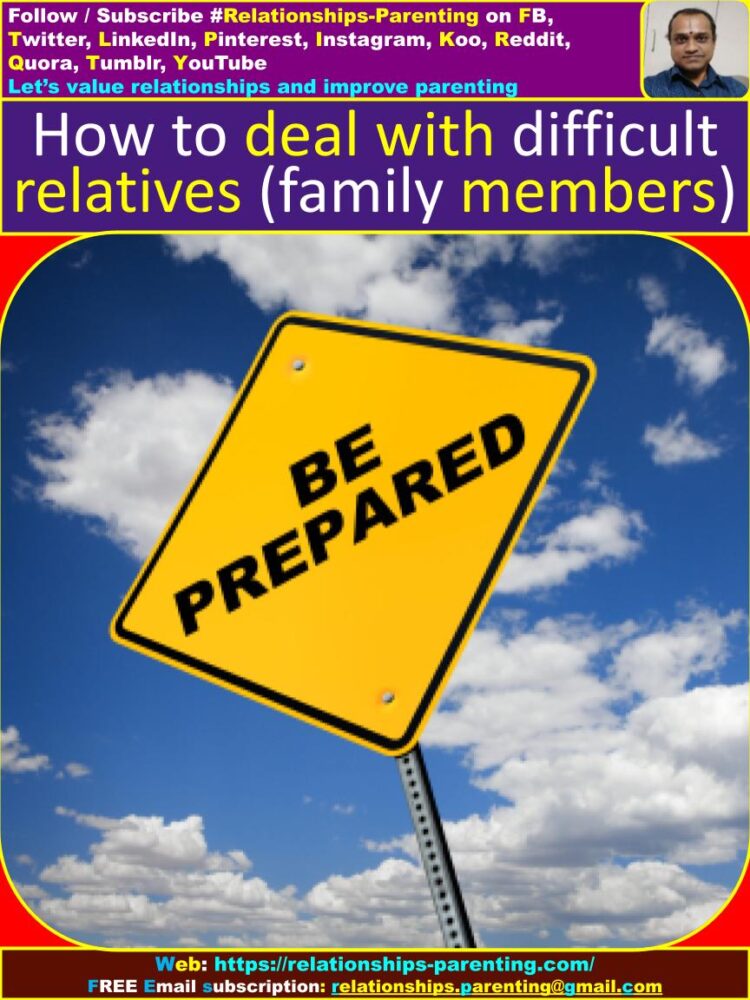
Let them express, you listen first : The ‘art of listening’ should be learned. Whatever the reason and situation, you should remain calm and listen carefully to your difficult relative or family member.
Listen to what they have to say first. Not everyone in this world is a good listener, but listening is very important for you to know the inner mood of your difficult relative or family member. Sometimes, many people want to be heard first.
Additionally, there’s a good chance that some part of what the person says is true. So first be a good listener.
Actively listening to what they have to say will help them feel a little more comfortable and accepting, and it will enable you to avoid any misunderstandings with them.
Let them fully open their point of view about the issue / conflict / problem with you without any hindrances and obstacles.
If your relative or family member has a difficult reputation, you may habitually ignore what they have to say. Take the time to listen to them thoroughly. Let them tell you what they think about you, negative or positive, and whether some aspects of their statement are correct.
Only after listening very carefully, you can give them a deep thought whether to continue with them or avoid them completely or partially. Do this with deep thought.
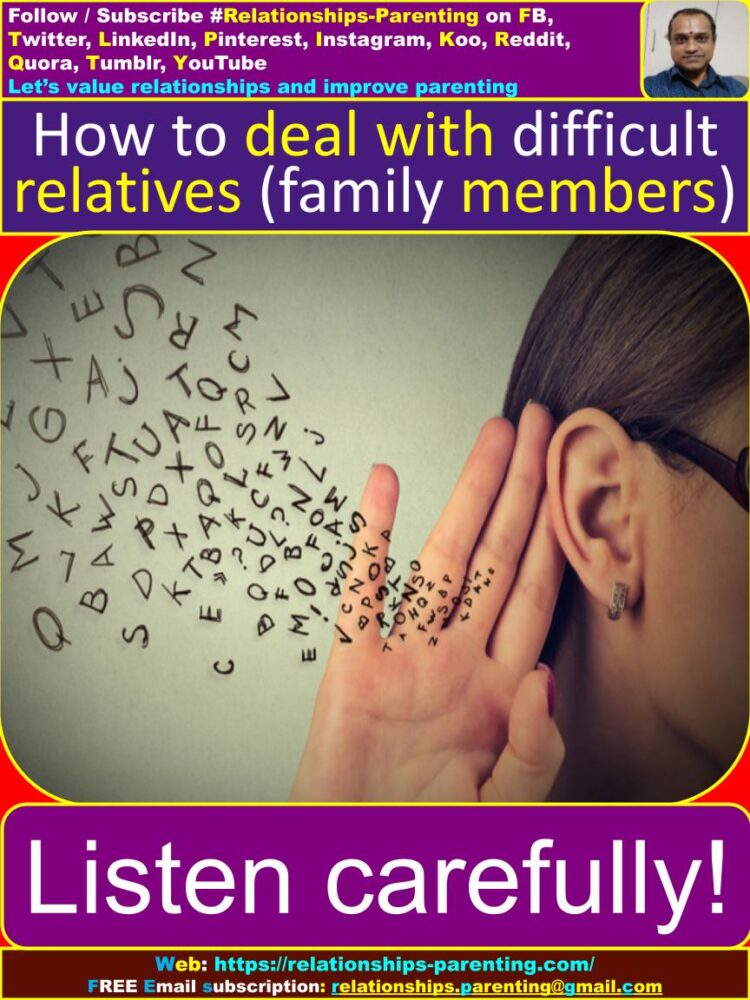
Watch their triggers : No two human beings have the same opinion. If you have your own point of view, your relative or family member will have their own viewpoint.
Inevitably there will be topics that represent consent, agreement, and likewise points of disagreement and disharmony. Know what these very sensitive issues are from your point of view and be very aware when they are brought up.
Your past experiences should help you, especially when you are dealing with these sensitive matters. Always be prepared to resolve these sensitive issues in a more harmonious and non-confrontational manner to avoid any conflict if the atmosphere becomes too heated.
If discussions about religion, politics, or money often lead to heated arguments, try your best to avoid these topics.
If your relative or family member insists on discussing issues that make you uncomfortable, limit yourself to listening to their words and avoid responding to their thoughts.
For some people, it is more important to discuss only unproductive and volatile topics, because they enjoy the drama around them and they do not want a fruitful outcome of those discussions.
If you don’t argue with them or try not to prove a point, they may tire of the discussion and end the topic quickly.
Of course, if their comments make you uncomfortable, there’s nothing wrong to ask for excuse and you can easily walk away from the discussion when you feel the discussion is pointless.
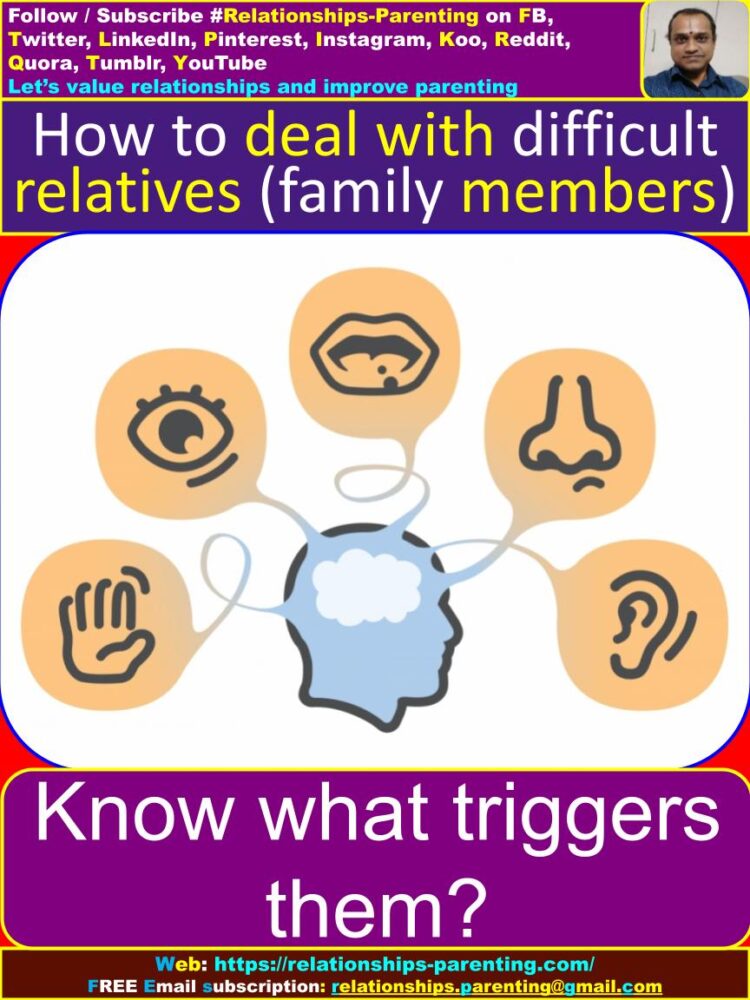
Pay attention to your feelings : When you pay attention to your emotional responses, your brain receives knowledge from your body and thus your body automatically get benefits from your brain.
In this way, you will be empowered to make choices that align with your true self. You become less vulnerable to what other people think of you. If you spend a lot of time with a difficult relative or family member, make sure you keep a tab on your emotions.
Pay attention to your stress level and know exactly about your own limits. If you’re feeling particularly upset or stressed, try deep breathing or other relaxation techniques. Also, look for ways you can take a break from stress, such as going to the restroom or taking your pet for a walk.
If the whole situation is too unbearable, don’t be afraid to cut the visit short and cut it off immediately. Knowing your own feelings can help you know what you want and make choices. It helps you relate to other people.
Difficult emotions (such as anger, stress, or sadness) help you get to know yourself. Paying attention to emotions is a skill that anyone can learn and practice any time.
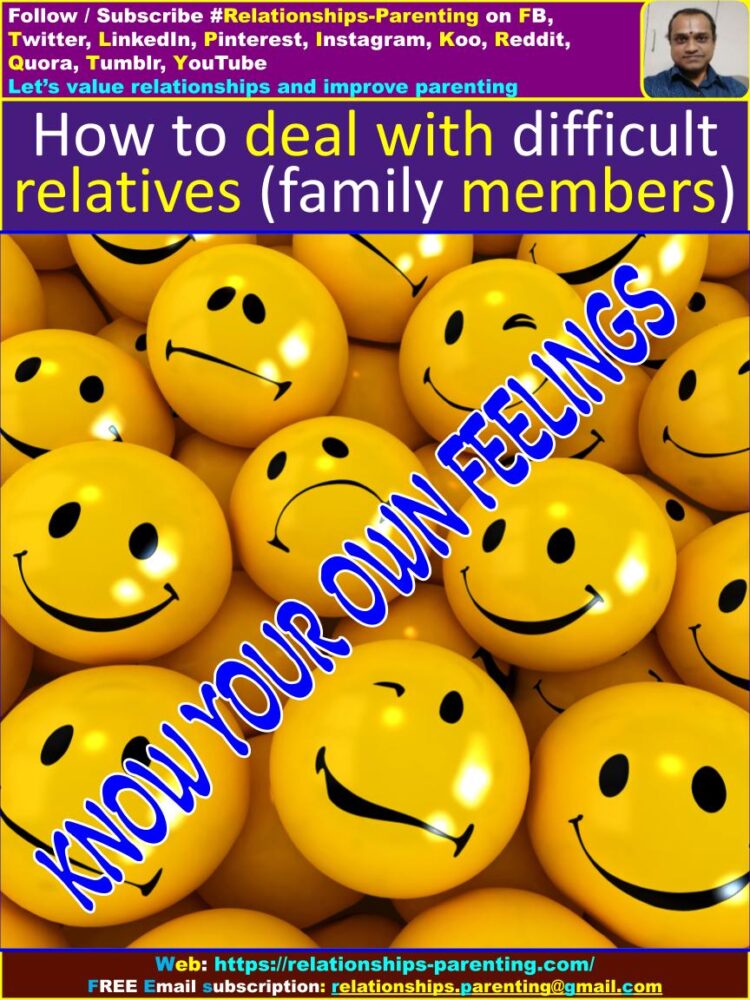
Remain cool and calm : This is an excellent mantra to maintain high dignity and show your bad relative or family member that you are not bothered by simple things.
Some relatives and family members may have a special knack for getting under your skin. However, if you let it, you might explode and make things worse. Keep your emotions under control when troubles and impatience arise around you.
Learn how to recognize when you are angry or impatient. When you get triggered by unwanted things, step away to get some fresh air, count numbers starting with 1, 2, 3… and practice deep breathing.
Being calm allows you to think logically and take decisions accordingly. Clarity of mind is very important when you are dealing with difficult relative or family member.
If your mind is active, free and calm, your clarity will help you work out solutions more easily and logically and very quickly. If you mind is relaxed, it allows you to discuss things instead of falling out.
If you are cool and calm, you will be able to discuss issues easily and confidently. Problems should be faced with cool and calm mind. Arguing or fighting unnecessarily will not provide a solution to your problem, and all involved may feel frustrated and irritated.

Make allies within your family : Family friends are a group of family members who join together for common objectives, goals and to defeat their opposition. By consolidating resources, family allies are essential members.
Family allies help create a happy and enjoyable environment and are also useful in completely eliminating unwanted situations among relatives and family members.
If you feel alone when dealing with a difficult relative or family member, it’s a good idea to reach out to others within the family.
By creating alliances within the family, you can apply ideas within the family boundary and come up with more effective ways to deal with other difficult relative(s) and family member(s).
Additionally, if someone else within your family understand how you’re feeling and about your situation, you won’t feel alone. For example, say to your brother / sister, “I need your support in dealing with neighbor Nikita this weekend. Can you help me with that?”
Family allies enhance your relationship and purpose. It increases your happiness and reduces your stress. Improve your self-confidence and self-esteem. Family allies can help you cope with trauma such as divorce, serious illness, job loss, or the death of a loved one.
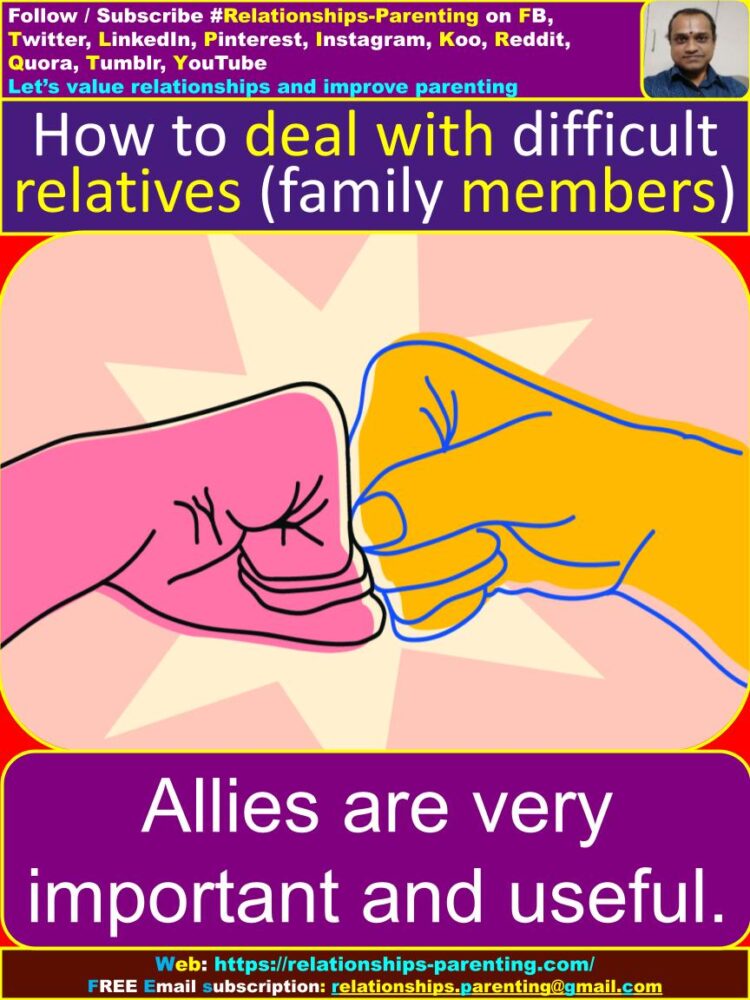
Fix unresolved family issues : It is one of the main and powerful criteria for increasing difficulties among relatives and family members.
If old issues are not resolved, it can lead to continued resentment or mistrust within your family. For example: Are your parents favoring your brother / sister, than you?
This type of jealousy can be a major source of tension between siblings in a family and needs to be addressed immediately without any delay. If you’re the one holding the problem, speak up as soon as possible.
Invite another person in your family to have a private conversation where you can bring up the issue and share your point of view. If family members are upset, show empathy. Try to understand how they perceive events and how the past is affecting them.
If you caused some harm to them in the past knowingly or unknowingly, apologize with the full heart and ask how you can fix the relationship or the damage within the family. Issues of conflicts that are not resolved peacefully can lead to disputes and resentment.
It is normal to have a small amount of disagreement with each other from time to time within the family. Occasional conflict is part of family life.
However, ongoing conflict can be stressful and damaging to relationships. Any small or large problems need to be resolved quickly by sharing ideas, otherwise it can be a big controversy and cause unhealthy problems.
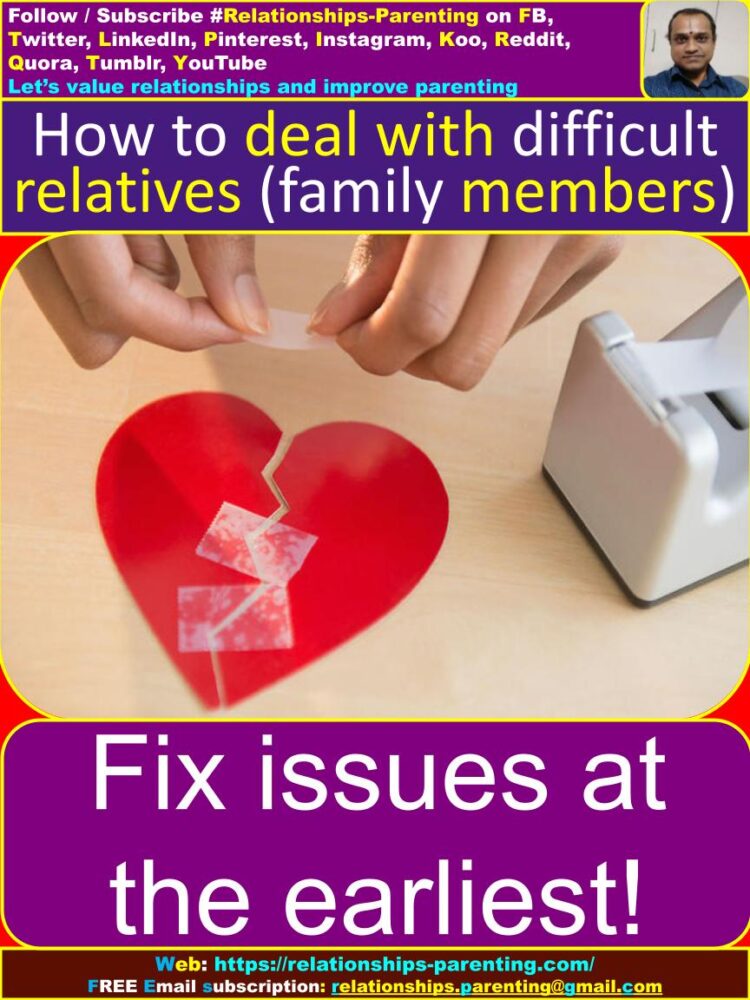
Take a break from your family : It is essential to give yourself time from everything including your family members. You need to explore your interests and hobbies and find out what it really makes you happy.
Take a break from spending time with the family. If your relatives and family members are coming under your skin, you can decide to take a few days break to clear your mind.
This is totally acceptable if you need to do to manage stress, stabilize your mind and reduce conflict with your difficult relatives or family members.
But before going, let your family know your real and correct intentions by saying something like this: “For me this is becoming too much. I need a break. I’m going back to our old house for the weekend to clear my mind”.

Be gentle and respectful : In today’s times, it may seem logical to ignore a family member who bothers you, but it can actually cause more problems to you and your other family members.
Say “Hi” when you see them and engage in small talk if you want. Then you can strategically avoid direct contact with them during events, engaging only if they contact you.
Understand how to set boundaries with difficult relatives or family members with a kind and equally gentle, but direct approach.
Whenever possible with your difficult relative or family member, it’s important to directly express your concern, perspective, and desire to set healthy boundaries.
Give importance on kindness and understanding while remaining firm in your decisions when setting boundaries with a difficult relative or family member and communicating expectations about how you want them to treat you.
If you’re nervous or unsure about taking the direct route, practice what you want to say to them. Before having a face-to-face conversation with your difficult relative or family member, test what you want to say in a mirror or with a trusted friend.
When you take a simple, straightforward approach, you may be surprised by how understanding and appreciative your difficult relative or family member is about your honesty.
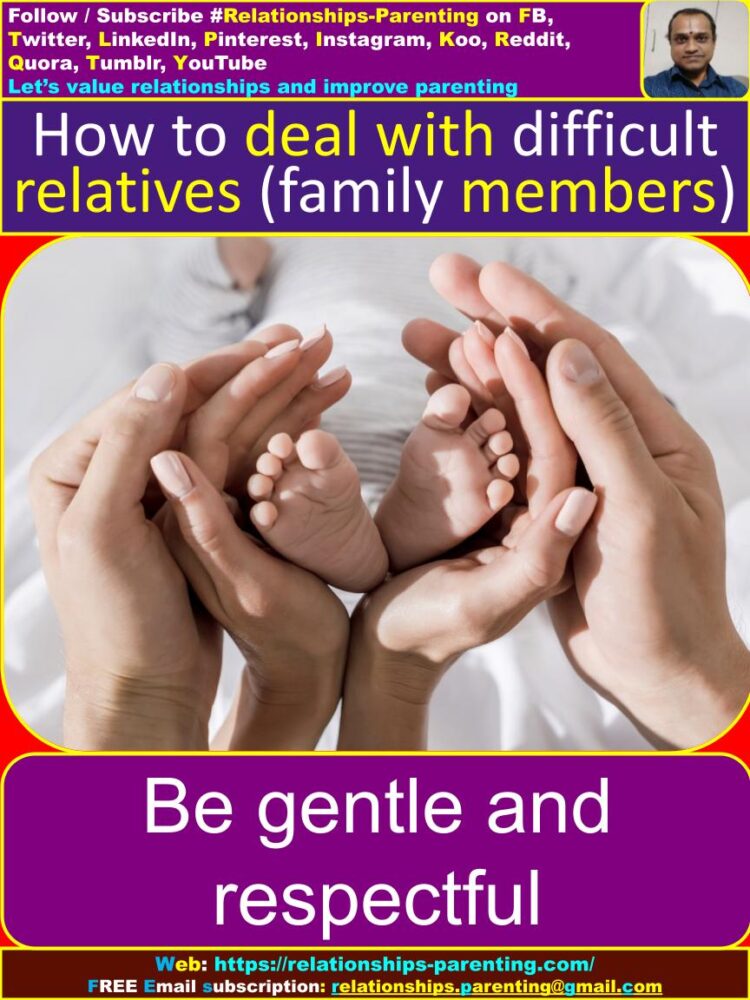
Avoid family gossips : Gossip with relatives or family members always leads to unnecessary conflict and feelings of resentment. Gossip is very harmful. Gossip often occurs when someone is upset about the person they are gossiping about.
It may make the person feel better for some time, but in the end it doesn’t solve the problem because the gossip itself is not done with kindness or love or with positive attitude.
The best way to set boundaries with difficult relatives or family members is to ignore family gossip completely regardless of the circumstances.
Many times, building healthy boundaries with your difficult relatives or family members can help you remove the toxins that are with us. Removing yourself from the family gossip circle means removing yourself from unwanted family conflict and drama.
This will definitely help build a constructive mindset in your family. If you stay away from family gossip, it will be more easier to avoid family unnecessary conflict and other dramas that are detrimental to your mental and emotional health.

Minimize the use of social media : Yes, today’s modern world depends on social networks. But we must remember that it is a part of your life and not ‘life itself’.
Minimizing social media is closely related to avoiding family gossip and drama, and is a great way to remove yourself from family gossip and other unnecessary conflicts.
If you’re having problems with family members, avoiding compromising situations is a good way to set healthy boundaries, and reducing your time on social media is an easy first step.
When difficult relatives or family members actively engage in conflict online, taking a break from social media can help reinforce your boundaries for yourself while removing yourself from unnecessary family conflicts or other drama.
It is absolutely right to minimize or avoid social media. Some research suggests that social media is harming us in several ways. Use social media wisely.

More information will be added to this on regular basis. Please visit this post and blog / website to know more about relationship and parenting.
Continue reading about:
To know more about “Husband and wife information, facts“, please click the below link:
Husband and wife information, facts
Dear friends, if you need any clarifications about this post, kindly let me know, I will definitely try to answer all of them.
Also add your COMMENT below, SHARE on different SOCIAL MEDIA networks.
This will help to know the quality of this content and also it will be helpful to know if any improvements is required for the content.
If you feel this content is useful to you and has helped you to improve your knowledge, kindly share this with your well-wishers.
Because “SHARING MEANS CARING”.
To receive FREE EMAIL SUBSCRIPTION about #Relationship #Parenting, you can send an email to [email protected] from your email ID.
Let you and your well-wishers live a prosperous, healthy and fearless life through out your life term.